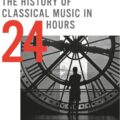Mar 21, 2017
From Anhedonia to Bliss
Anhedonia – now there’s a word for you. Did I hear you say it’s not one you use frequently? Neither do I. But it’s an important one. Anhedonia (notice the letters ‘h e d o n’ in there, as in hedonism) is the inability to feel pleasure. And the word features prominently in a March 10, 2017 article: Inside the Heads of People Who Don’t Like Music in the Atlantic Monthly.
Apparently, 3-5% of the world’s population suffers from ‘musical anheodnia.’ That statistic caught my eye due to the similarity of the data that estimates that only 3-5% of the US population regularly listens to classical music. So on the one hand we have a tiny group that cannot be moved by any kind of music whatsoever and a similarly tiny group that is sent ‘into orbit’ when listening specifically to classical music. Interesting.
The Atlantic article by Divya Abhat details information about a recent study published in the Proceedings of the National Academy of Sciences that detailed the neural responses to music of 45 students from the University of Barcelona. Ms. Abhat further states: “For people who enjoy music, activity in the brain’s auditory and reward regions is closely coupled and, for them, hearing a song resulted in joy and pleasure. But, in the brains of people with specific musical anhedonia, researchers found that the auditory and reward regions didn’t interact in response to music.”
Obviously, at The Discovery Orchestra, where our mission is to “teach the listening skills that help people really connect with classical music,” this is important information to know. There are some people simply beyond our reach.
But – if we subtract the 3-5% of the population that cannot respond to any music, and also subtract the 3-5% of the population that loves to listen to classical music that leaves a healthy 90-94% of people out there for us to work on!
 Another eye catching article from February 28, 2017 by Dorri Olds in the fix, is entitled Does Music Affect The Brain in the Same Way as Drugs and Sex? Apparently so! Ms. Olds is a freelance writer who may be read in such publications as The New York Times, Woman’s Day, TimeOut NY and the fix – and a truly remarkable person should you care to Google her. She writes: “According to a study published in Scientific Reports, your brain’s natural opioids are released when you are grooving to your favorite music. This is the same chemical reaction in your noggin that lights up when you have sex, taste food, or partake in recreational drugs.”
Another eye catching article from February 28, 2017 by Dorri Olds in the fix, is entitled Does Music Affect The Brain in the Same Way as Drugs and Sex? Apparently so! Ms. Olds is a freelance writer who may be read in such publications as The New York Times, Woman’s Day, TimeOut NY and the fix – and a truly remarkable person should you care to Google her. She writes: “According to a study published in Scientific Reports, your brain’s natural opioids are released when you are grooving to your favorite music. This is the same chemical reaction in your noggin that lights up when you have sex, taste food, or partake in recreational drugs.”
This study was conducted at McGill University by neuroscientist, musician, professor, author Daniel Levitin whom you may know from his best selling book This Is Your Brain On Music – another recommended read. Ms. Olds notes: “The researchers acknowledged that preliminary studies had shown that listening to music – and performing it – changes your levels of serotonin, epinephrine, dopamine, oxycotin, and prolactin.”
“. . .Scientists already knew that the opioid and dopamine systems are linked; previous research has shown that blocking the opioid system can reduce the activity of the other feel-good chemical, dopamine – but this research was related to food, drink and drugs. Levitin’s study is the first to experiment on how the brain’s internal opioid system reacts similarly to music.” She goes on to quote a statement by Professor David Zald of Vanderbilt University in Newsweek: “[Music] can be viewed as a ‘healthy addiction.'”
Amen! Well, as I said in the cold open of our first public television show Bach to the Future: “If I could give you something that would make you feel wonderful – would you take it? Although it’s definitely habit forming, it’s not a drug, has no known side effects and its benefits can last your entire lifetime. It’s listening to classical music!”









